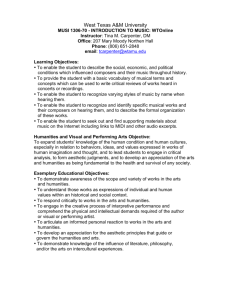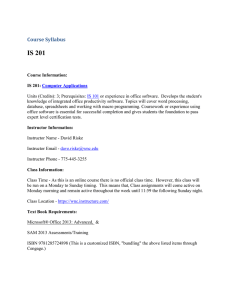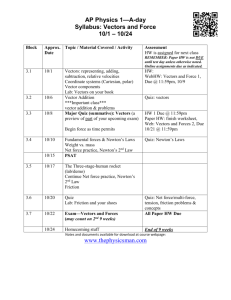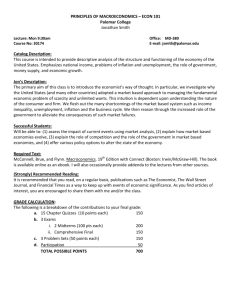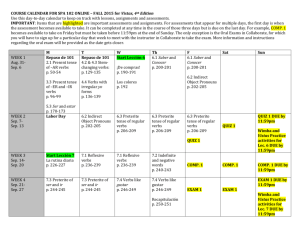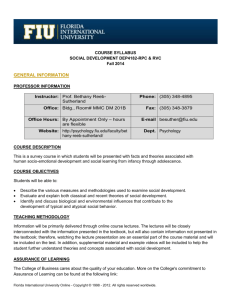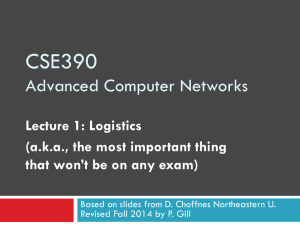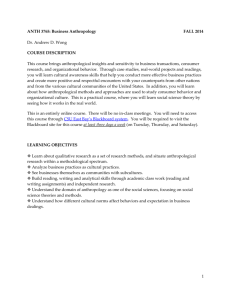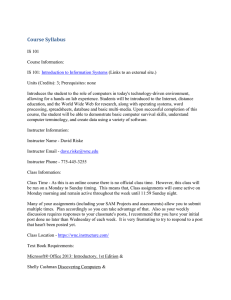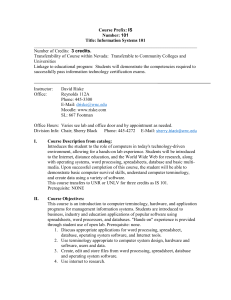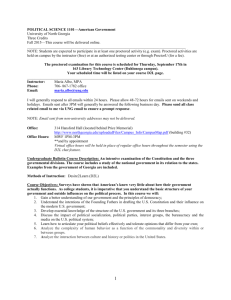PSYC 100: Introduction to Psychology
advertisement
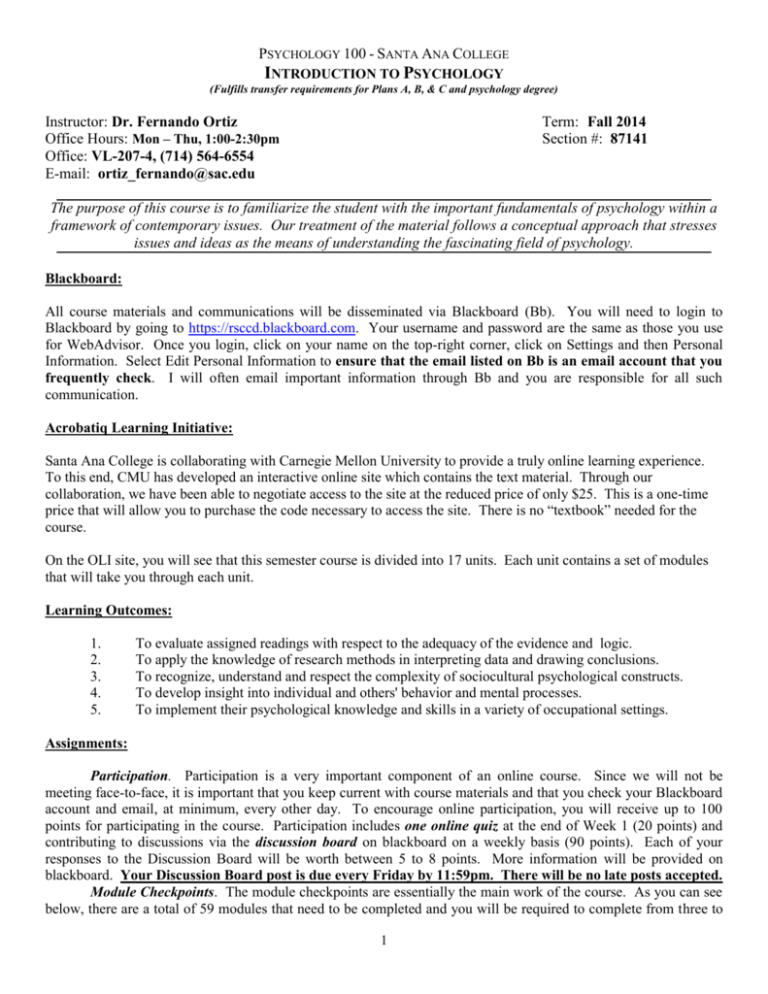
PSYCHOLOGY 100 - SANTA ANA COLLEGE INTRODUCTION TO PSYCHOLOGY (Fulfills transfer requirements for Plans A, B, & C and psychology degree) Instructor: Dr. Fernando Ortiz Office Hours: Mon – Thu, 1:00-2:30pm Office: VL-207-4, (714) 564-6554 E-mail: ortiz_fernando@sac.edu Term: Fall 2014 Section #: 87141 The purpose of this course is to familiarize the student with the important fundamentals of psychology within a framework of contemporary issues. Our treatment of the material follows a conceptual approach that stresses issues and ideas as the means of understanding the fascinating field of psychology. Blackboard: All course materials and communications will be disseminated via Blackboard (Bb). You will need to login to Blackboard by going to https://rsccd.blackboard.com. Your username and password are the same as those you use for WebAdvisor. Once you login, click on your name on the top-right corner, click on Settings and then Personal Information. Select Edit Personal Information to ensure that the email listed on Bb is an email account that you frequently check. I will often email important information through Bb and you are responsible for all such communication. Acrobatiq Learning Initiative: Santa Ana College is collaborating with Carnegie Mellon University to provide a truly online learning experience. To this end, CMU has developed an interactive online site which contains the text material. Through our collaboration, we have been able to negotiate access to the site at the reduced price of only $25. This is a one-time price that will allow you to purchase the code necessary to access the site. There is no “textbook” needed for the course. On the OLI site, you will see that this semester course is divided into 17 units. Each unit contains a set of modules that will take you through each unit. Learning Outcomes: 1. 2. 3. 4. 5. To evaluate assigned readings with respect to the adequacy of the evidence and logic. To apply the knowledge of research methods in interpreting data and drawing conclusions. To recognize, understand and respect the complexity of sociocultural psychological constructs. To develop insight into individual and others' behavior and mental processes. To implement their psychological knowledge and skills in a variety of occupational settings. Assignments: Participation. Participation is a very important component of an online course. Since we will not be meeting face-to-face, it is important that you keep current with course materials and that you check your Blackboard account and email, at minimum, every other day. To encourage online participation, you will receive up to 100 points for participating in the course. Participation includes one online quiz at the end of Week 1 (20 points) and contributing to discussions via the discussion board on blackboard on a weekly basis (90 points). Each of your responses to the Discussion Board will be worth between 5 to 8 points. More information will be provided on blackboard. Your Discussion Board post is due every Friday by 11:59pm. There will be no late posts accepted. Module Checkpoints. The module checkpoints are essentially the main work of the course. As you can see below, there are a total of 59 modules that need to be completed and you will be required to complete from three to 1 four modules per week. Modules for the week are due on Sunday at 11:59pm. It is important that you manage your time and spread these out throughout the week in order to do well. ALSO, if you are a “weekend person” and enjoy taking time off of school during the weekend, you will need to manage to have these done prior to the weekend. There are no make-ups or extensions on modules. Thought Papers. You will be required to complete a total of four (4) thought papers. These are two page (typed, double-spaced) essays on topics related to the course material. These will be assigned one week before they are due. You will need to submit these thought papers directly through Blackboard (instructions to follow). Emailed Thought Papers will not be accepted. Exams. A total of four (4) exams will be administered throughout the semester. Exams will be based on material covered in the unit modules. Each exam will consist of multiple-choice questions and will be completed online. Since you will typically have a window of two days to complete the exam, there will be NO MAKE-UP EXAMS!! More information on these exams will be announced on Blackboard. Course grade: Therefore, your grade in the course will be based on the following criteria: Participation (Week 1 Quiz, Weekly Discussion Board responses) Module Checkpoints 59 @ 4 points each (+ one free) Thought Papers (4) @ 25 points each Exams (4) @ 100 points each Total 110 points 240 points 100 points 400 points 850 points Final course grades are based on the following point distribution: A = 90-100% (765-850 points) B = 80-89% (680-764 points) C = 70-79% (595-679 points) D = 60-69% (510-594 points) F = Below 60% (509 points or fewer) Cheating/Plagiarism If you are caught cheating or plagiarizing (using another person’s work/words as your own), you will receive an automatic zero on the assignment that you cheated on and an Academic Dishonesty report will be filed with the Division Dean and the Dean of Student Activities for further action. Withdrawal During the first week of the course, you will be required to take a short quiz on Blackboard. This quiz is primarily designed to “take roll.” Students who do not complete this quiz will be dropped from the course. Be sure to note that after week two (September 7), it is your responsibility to withdraw from the course if you no longer wish to stay enrolled. The last day to drop the course with a “W” grade is November 16. If you fail to take this responsibility, the grade posted to your transcript will be based on your points earned in the course. DSPS Statement A student with a disability, who would like to request an academic accommodation, is responsible for identifying herself/himself to the instructor and to the Disabled Student Programs and Services (DSPS). To make arrangements for academic accommodations, contact the DSPS Office in Johnson Center, U-103, or phone (714) 564-6284 for a referral to the appropriate DSPS Department. 2 MODULE and EXAM Schedule Section #: 87141 – Fall 2014 Unit Unit 1: Learning Strategies Unit 2: Introduction Unit 3: Methods Unit 4: Brains, Bodies, and Behavior Unit 5: Sensing & Perceiving Unit 6: Learning Module Due Dates Module Read over Unit 1 and carefully read syllabus to prepare for the Quiz (20 pts of Participation grade). Students who do not complete Quiz will be dropped from the course 1. Welcome to Psychology Aug. 31 at 2. History and Perspectives 11:59pm 3. Scientific Method Exams QUIZ Due Friday, August 29 by 11:59pm 4. Research Designs 5. Neurons: The Building Blocks of the Nervous System 6. Brain Regions Sep. 7 at 11:59pm 7. Methods of Studying the Brain 8. The Nervous System and the Endocrine System 9. Introduction to Sensing & Perceiving 10. Seeing: The Visual System 11. Audition & Other Senses 12. Perception: Interpreting Sensation Based on Knowledge 13. Classical Conditioning 14. Operant Conditioning Exam I (Unit 2 – Unit 6) Available on Monday, Sep. 22 at 12:01am Sep. 14 at 11:59pm Due by Tuesday, Sep. 23 at 11:59pm Sep. 21 at 11:59pm 15. Learning by Insight and Observation 16. Types and Stages of Memory Unit 7: Memory Unit 8: Language Unit 9: Intelligence 17. How we Remember: Cues to Improving Memory Sep. 28 at 11:59pm 18. The Biology of Memory 19. Accuracy and Inaccuracy in Memory and Cognition 20. Communicating with Others: The Development and Use of Language 21. Defining and Measuring Intelligence Oct. 5 at 11:59pm Available on Monday, Oct. 20 at 12:01am 22. Bell Curve 23. Sternberg & Gardner 24. Issues and Controversies Related to Intelligence 25. Introduction to Lifespan Development Oct. 12 at 11:59pm 26. Prenatal and Early Development Unit 10: Lifespan Development Exam II (Unit 7 – Unit 10) 27. Cognitive Development in Childhood 28. Social & Personality Development in Children 29. Development During Adolescence 30. Adulthood: Early, Middle, and Late 3 Oct. 19 at 11:59pm Due by Tuesday, Oct. 21 at 11:59pm Unit 11: Emotion and Motivation Unit 12: Personality Unit 13: Psychology in Our Social Lives Unit 14: Wellness 31. Experience of Emotion Oct. 26 at 11:59pm 32. Positive Emotions 33. Human Motivation 34. Personality and Behavior: Approaches and Measurement 35. The Origins of Personality 36. Is Personality More Nature or Nurture? Behavioral and Molecular Genetics 37. Social Cognition: Making Sense of Ourselves and Others 38. Interacting with Others: Helping, Hurting, and Conforming 39. Working with Groups: The Costs and Benefits of Social Groups 40. Having Balance in Your Life 41. Maintaining Balance and Optimal Wellness in Your Life 42. Being Out of Balance 43. Stress Nov. 2 at 11:59pm Exam III (Unit 11 – Unit 14) Available on Monday, Nov. 17 at 12:01am Nov. 9 at 11:59pm Due by Tuesday, Nov. 18 at 11:59pm Nov. 16 at 11:59pm 44. Pain Management 45. Mindfulness 46. Defining Psychological Disorders Nov. 23 at 11:59pm 47. Anxiety and Related Disorders 48. Mood Disorders Unit 15: Disorders 49. Schizophrenia 50. Personality Disorders Nov. 30 at 11:59pm 51. Neurodevelopmental Disorders Available on Monday, Dec. 15 at 12:01am 52. Controversies and Conclusions 53. Psychotherapy Unit 16: Treatment 54. Biomedical Dec. 7 at 11:59pm 55. Social 56. Prevention 57. Introduction to Consciousness Unit 17: Consciousness Exam IV (Unit 15 – Unit 17) 58. Sleeping and Dreaming Revitalize Us for Action 59. Altering Consciousness With Psychoactive Drugs 4 Dec. 14 at 11:59pm Due by Tuesday, Dec. 16 at 11:59pm
